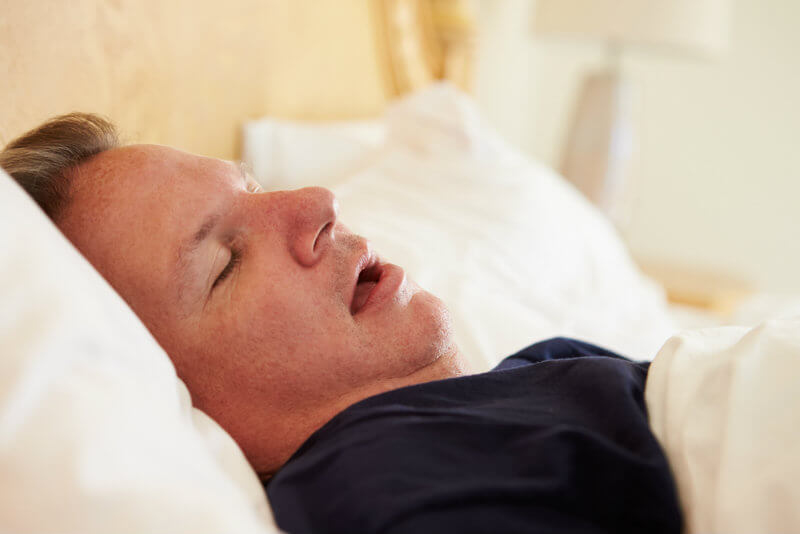Snoring, or the production of irregular noises during sleep, is a common disorder which, according to some studies, up to 50% of adults suffer from – either chronically or periodically. Although snoring occurs in both genders, statistically it seems that women do not experience this problem as often as men. Snoring also tends to get worse as people get older. Sometimes, adults who sleep alone are not even aware that they have a snoring problem.
And while snoring is often confused with sleep apnea, the truth is that not all people suffering from sleep apnea snore. Therefore, snoring does not necessarily mean that you have sleep apnea.

Basically, snoring happens when airflow during sleep is disturbed or obstructed in some way. When you breathe, often more inhaling then exhaling, the air going through your airway vibrates and produces sound. The tighter the airway gets, the more the air vibrates, and the louder your snoring is. There can, however be many causes of this, and possible treatments can vary depending on those causes and which measure suits you best personally. These range from more conservative methods, like simple lifestyle changes, to invasive surgeries.
If you have problems with snoring, you could either be suffering from a physical condition, or something about your environment or living habits might be getting in the way of normal breathing during sleep. If this bothers you, perhaps you should consider figuring out the underlying cause.
Physical Causes
One of the most common physical causes, which people suffering from snoring problems might not even be aware of, is their own mouth anatomy. For example, if the roof of your mouth is low and soft, your airway might be getting narrow while you are asleep, thus making it harder for air to pass through.
Another problem which often occurs in overweight people, is that they have extra fat tissue layered around the airway which, again, narrows it and obstructs airflow.
Also, if that triangular piece of tissue hanging from the back part of the roof of your mouth is longer than it should be, this can cause vibrations while breathing and produce snoring.
 Your nose might be a problem as well. If the parting between your nostrils – commonly known as a deviation – is crooked or excess mucus chronically piles up in your nose, you could end up snoring. Any other types of nose deformities or irregularities can contribute to this as well, such as enlarged tonsils or adenoids, nasal polyps, or deviated nasal septum, and would most likely need to be surgically treated. Nose inflammations, such as those you get from colds or allergies, often have the same effect.
Your nose might be a problem as well. If the parting between your nostrils – commonly known as a deviation – is crooked or excess mucus chronically piles up in your nose, you could end up snoring. Any other types of nose deformities or irregularities can contribute to this as well, such as enlarged tonsils or adenoids, nasal polyps, or deviated nasal septum, and would most likely need to be surgically treated. Nose inflammations, such as those you get from colds or allergies, often have the same effect.
Perhaps the most dangerous physical condition which can cause snoring is obstructive sleep apnea. People suffering from OSA have collapsed throat tissue obstructing their airway, causing breathing to slow down or even completely stop during sleep, which automatically causes the person to wake up gasping for air. This can occur many times during the night, and the person will probably not even remember it. Unfortunately, besides sleep deprivation, this can cause terrible headaches in the morning, excessive daytime sleepiness and fatigues, and generally reduce a person’s quality of life as they might not be able to function normally during the day.
Environmental and Lifestyle Causes
Ever notice how some people snore only when they fall asleep after drinking lots of alcohol? Excess alcohol consumption, while it generally relaxes your body, can also relax your throat muscles to the point where your airflow is distorted, and you can start producing snoring sounds.
You are probably aware that your sleeping position is also very important, but do you know why this is? Gravity! While you lie on your back, gravity is pulling on your throat and narrowing your airway. So, try not to fall asleep on your back, especially after a night of drinking! If you don’t want your snoring to bother anyone, that is. Instead, try to always fall asleep on your side.
It is worth mentioning that some medications, such as sedatives, can have a similar effect as alcohol. Obviously, they also act as muscle relaxants and lead to airway obstruction by throat muscles. This is why you might have noticed that people who have started taking sedatives as medication have also begun snoring, or their snoring got worse.
Even sleep deprivation can ultimately lead to snoring when you do fall asleep. Not sleeping regularly or enough can actually cause your throat muscles to relax, so when you are asleep they keep the air from going through your airway properly.
Summing it Up
While as much as half the world’s adult population experiences snoring at least sometimes, if not every night, the underlying causes are often not well understood.
Is your snoring caused by physical, or lifestyle issues? Anything from nose deviations, sleep apnea, allergies, to your sleeping position or alcohol consumption before bedtime might have a great influence on your snoring issues. Genetic factors can also play a role, so if some of your family members also snore, it might have been passed on to you. The problem is, not only could you have an underlying medical condition, but you might also cause sleeping problems for those you live with. This is why it is important to carefully think about what the cause might be, how to address it, and even visit a doctor. Good luck!